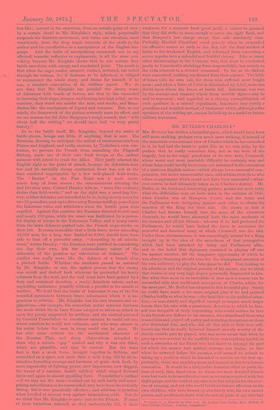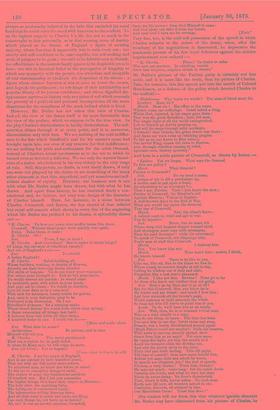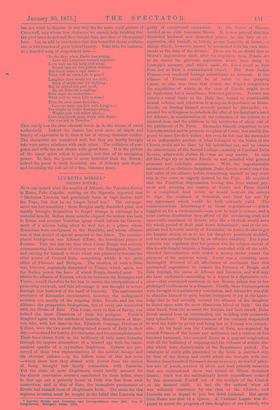MR. BUTLER'S CHARLES I.*
Mn. BUTLER has written a beautiful poem, which would have been still more striking, perhaps even much more striking, if instead of the somewhat conventional view of Charles which he has embodied in it, he had had the heart to paint him as we may judge by the preface that he really conceives him, not as the hero of the tragedy, but as the tragic proof-test of its true hero, Cromwell, whose worst and most insoluble difficulty he certainly was, and whose fame could hardly have come out unstained in the estimation of a cautious English nation—which always loves successful com- promises, but never unsuccessful ones, and seldom even those who. refuse compromises which could not have been successful—what- ever course he had ultimately taken as to Charles's destiny. Mr._ Butler, in the lucid and interesting preface, points out most truly what the difficulties were on both sides in the autumn of 1647, when Charles was at Hampton Court, and the Army and the Parliament were intriguing against each other to obtain the sanction of the King for their side. He shows us that if Charles had thrown himself into the arms of the victorious. Generals, he would have alienated both the more moderate of his enemies and all his friends ; whereas if he had preferred the Parliament, he would have lacked the force to overcome the powerful and fanatical army of which Cromwell was the idol. Under these circumstances, it was exceedingly natural for a King brought up in the idea of the sacredness of that prerogative which had been attacked by Army and Parliament alike, and in the belief that diplomacy consisted in playing off one- foe against another, till the imaginary opportunity of which he was always dreaming should arise for the triumphant assertion of his own authority, to play the false game he did. Nor, looking to his education and the original poverty of his nature, can we think that course in any very high degree personally disgraceful to him. But what does seem to us incredible is that such a course can be reconciled with that traditional conception of Charles which, for the most part, Mr. Butler has adopted in this beautiful play. Surely he could have made a far more original play if he had painted Charles boldly as what he was,—the fatal blot on the political situa- tion,—a man stately and dignified enough to inspire much larger hearts than his own with a passionate devotion to which he him- self was incapable of truly responding, who could neither be true to his friends nor defiant to his enemies, who abandoned those who trusted him and played off paltry and irritating deceptions on those who distrusted him, and who did all this with so little true self- knowledge that he really believed himself morally worthy of the stately outside part he played, who was never aware that when he gave up a true servant to the scaffold there was anything ignoble in such a surrender of the friend who had dared to attempt the part for which his master had neither courage nor brains, or that when he cowered before his enemies, and seemed to submit to taking up a position which he intended to reverse on the first op- portunity, there was anything mean and unroyal in this treacherous concession. It would be a truly noble dramatic effort to paint the man of cold, thin, fixed ideas, to whom the most devoted friends were but tools to be sacrificed as soon as occasion required with but slight pangs, and the noblest enemies were but subjects for the exer- cise of cunning, and yet who could lavish an intense affection on his own children, who were bound up absolutely with his own sacred person, and could meet death with the stately pride of one who had '" Charles I.: a Tragedy in Floe Acts. By Arthur Gray Butler, M.A, Fellow at Oriel College, Oxford. London: Longmaue. always so profoundly believed in the halo that encircled his royal head that he could carry the creed with him even to the scaffold. To us the highest tragedy in Charles I.'s life lies not so much in the catastrophe to him personally, as in that seeming irony of destiny which placed on the throne of England a figure of seeming majesty, whose function it apparently was to ruin every one ; too stately and self-confident to be contemptible, too self-seeking and weak of purpose to be great ; too cold to be faithful even to friends, too affectionate in the narrow family sphere to be despicable even to foes ; too rich in fanatical belief in the prerogative of kingship to admit any sympathy with the people, too irresolute and incapable of real statesmanship to vindicate the despotism of the throne ; a figure whose sinister function it was at once to lower the crown, and degrade the parliament; to rob kings of their inviolability and popular liberty of its joyous confidence ; and whose dignified dis- appearance survives in history only as a painted veil which conceals the poverty of a political and personal incompetence all the more disastrous for the seemliness of the mask behind which it lived.
However, Mr. Butler has not taken this view of Charles. Indeed, the view of the drama itself is far more favourable than the view of the preface, which we suppose to be the true view. In the play Charles's dissimulation is hardly dissimulation. The self- assertion shines through it at every point, and it is, moreover, dissimulation only with foes. We see nothing of the cold indiffer- ence to the fate which Strafford's zeal for his master's cause had brought upon him, nor even of any remorse for that indifference ; we see nothing but pride and enthusiasm for the noble Ormond, instead of Charles's actual carelessness as to the use to which he turned even so devoted a follower. We see only the narrow fanati- cism of a zealot, who believed in his own victory to the very verge of ruin. Still, this picture, no doubt, is very finely drawn, if only one were not plagued by the desire to see something of the many other elements in that thin, superficial, and yet tenacious and self- reliant shadow of royalty. However, our business now is not with what Mr. Butler might have drawn, but with what he has drawn. And apart from history, he has executed finely a con- ventional and, we believe, not very true design of the character of Charles himself. Here, for instance, in a scene between Charles, Cromwell, and Ireton, the fine thread of that inflated but royal self-conceit which shows in every line of the engraving which Mr. Butler has prefixed to his drama, is splendidly drawn out :— 4 K Charles. Ye love not peace who proffer terms like these.
Cromwell. Without them peace were quickly war again. Ireton. Take these, or none ! K. Charles. Sir!
fret. These, I say, or none ?
K. Charles. And wherefore ? But to make of rebels kings?
Of kings, the servants of rebellious vassals? And out of England's ruin-
Iret. To rebuild A better England !
K. Charles. Babel-building all,
Whose builders, working in despite of Heaven, Already see their towering dream dissolve Mid strife of tongues. Ye do not know your weakness, Nor where your strength is. Felt ye but your needs, Ye would entreat my pardon : ye would come In sackcloth, pale, with ashes on your heads, And pray me to return : Ye would go barefoot, Live all your days as in a cemetery, With eyes for mourners, heavy hearts for graves, And, next to your Salvation, pray to be Delivered from dissension. Oh I see Rebellion's sickness: 'tis a teeming snake Whose brood devour the womb from which they sprang : A flame consuming all things, last itself : A hideous deep that holds all other deeps,
A hundred deeps in one. I could run on—
[Rises and walks about.
fret. What does he mean?
Ashburnham. Be patient, and in time Himself will tell you.
K. Charles. The worst punishment
That can a nation for its guilt befall, Is when its King says, he will reign no more.
fret. (to Crom.) Let us begone !
[Crom. signs to him to be still.
K. Charles. I am the peace of England,
And in me outcast ye have banished peace, That but with me will never more return.
Ye misprond men, ye know not where ye stand ; Ye bid me to remember things of earth, The chance of arms, the treacherous accident Of freakish war. But I bid you remember
Far higher things, that have their source in Heaven—
The holy altar, the anointing balm, The laying-on of consecrated hands, The intercession calling blessing down, And all that went to mark and make me King. Can such things be, yet leave us as before?
Ab, no ! it was no mortal sanction, Cromwell, Gave me the power : from God Himself it came : And God alone can take it from my hands, And unto God I turn me for revenge. [Exit."
Very fine, too, is the cold self-possession of the speech in which Charles submits to the orders of the Army, when, after the treachery of his negotiations is discovered, he deprecates the passionate protest of his few loyal followers against the stricter imprisonment now ordered :—
" K. Charles. Peace! 'Ms theirs to order
Who now are masters. In rebellion, swords Grow into sceptres, sceptres shrink to straws."
Mr. Butler's picture of the Puritan party is certainly not less noble, and it is more like the truth, than his picture of Charles. Take, for instance, this fine speech put into the mouth of Colonel Hutchinson, as a defence of the policy which devoted Charles to the scaffold :—
"Hutchinson. Why waste we words ? The man.of blood must die.
Lambert. Must die?
Hutch. Must die I His office is the cause
Whence come our sufferings. Israel asked a king,
Which God, rejected, in his anger gave them:
That was the great Rebellion; then did man, The single light of all the world extinguished, Left to himself go darkly groping on, And soil his steps through miry accidents. 0 friends! dear friends, the great revolt was there : And these our wars come as rebuking plagues To bid us on our knees to Him return, Our lawful King, renew old vows to Heaven, And, through rebellion ceasing to rebel, Apostate once, destroy apostacy."
And here is a noble picture of Cromwell, as drawn by Ireton :-
"Ludlow. Yet we forget. What says the General To this our policy ? Hutch. What General ? Fairfax or Cromwell ?
Iret. Do we need a name,
A scrape of ink to fill a parchment up, A leaden seal to put upon a bond, An attestation to an inventory ?- Then I say, Fairfax. Tush ! you know the men ; Fairfax to Cromwell, 'tis Minerva's owl Against Minerva : Vulcan to Jupiter : A dull-browed Ajax to the God of War.
What you would say about the General, That say of Cromwell.
Hutch. Nay, the other's brave : A valiant captain, tried and apt to war. You do injustice.
Iret. Brave, but no more wit Where deep-laid dangers deeper counsel need, And stratagem must cope with stratagem, Than his paid drummer ! while (in reverence) To speak of Cromwell, not disparage him, Needs men of stuff like Cromwell.
Hutch. I distrust him. fret. You know him not.
Hutch. None know him : scarce, I think, He knows himself.
Iret. There is he like to you,
Like me, like all, like to the times we live in : Where young to-morrow laughs at old to-day, Calling its wisdom out of date and stale, Forgotten like a last year's almanack
Hutch. I like not this. Beware I None go so far
As those who know not whither they are going.
Iret. Better go far than not to go at all
But for this Cromwell, Sirs, you know he is My leader and my friend: and much I love him : And love unravels oft the bosom's page, Where jealousy at fault misreads the whole.
So from my love I'll strive to paint him to you.
Lamb. So do, we'll hear you as an oracle.
Iret. Well, then, he is no common trivial man,
Who as a zany simply is a zany, Can do one thing, no more. The time has been I've seen him in one day, 'twist morn and even, Preach, win a battle, bloodstained preach again (Hugh Peters could not readier): while his hearers, With souls in heaven, already parted, drew Grace from him as an angel. Yet once more, By camp-fire light, see him the revel's lord Amid his troopers clink the flowing can, And suit the merry story to the hour, Their idol and their darling. This till night, Till time of council! then once more behold him, Ardent yet sage, bold and adroit by turns, In speech not eloquent, yet i' the soul of speech, Wisdom, a very Nestor! Trust him, friends! He says not much: waits long : but his quick deeds Outstrip his words, and what he once has done Needs no twice-doing: 'tie Jove's thunderbolt That, where it falls, leaves ashes. No such man Earth saw till now, all wonders mixed in one, Confusion, discords, all attuned in him, Our Maccabean Caesar. Trust him then I"
Our readers will see from this that whatever ignoble elements Mr. Butler may have eliminated from his picture of Charles, he has not tried to disguise in any way the far more royal picture of Cromwell, into whose true character we cannot help thinking that the poet has a deeper and finer insight than into that of his nominal hero. Let us add in conclusion that this beautiful drama contains one or two touches of great lyrical beauty. Take this, for instance, as a fanciful song of despondent love :—
"In the days when Earth was young, Love and Laughter roamed together: Love took up his harp and sung,
Round him all was golden weather.
But there came a sigh anon- ,* What will be when Life is gone?
Laughter then would try his skill, Sang of mirth and joy undying : But he played his part so ill, He set Echo all a-sighing.
Ever came an undertone—
What will be when Life is done?
Then for ever since that time,
Love no more can live with Laughter : For bright as is the Summer-prime, Winter pale will follow after,—
Love henceforth must dwell with Sighs : Joy was left in Paradise." •
That surely has the true ethereal touch in it, the aroma of sweet melancholy. Indeed the drama has even more of depth and beauty of expression in it, than it has of strong dramatic outline. The characters are conceived well, but they are hardly brought into very active relations with each other. The collisions of pur- poses and wills are not drawn with great force. It is the picture of the inner spirit which is painted, not that of its energising power. In fact, the poem is more beautiful than the drama ; indeed the poem is truly beautiful, one of delicacy and depth, and breathing the soft air of a fine, visionary fancy.




































 Previous page
Previous page